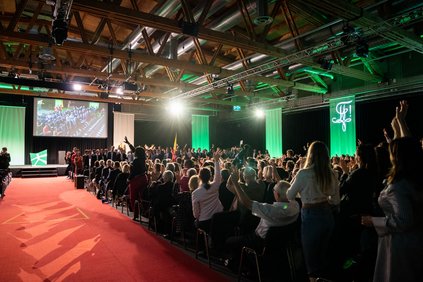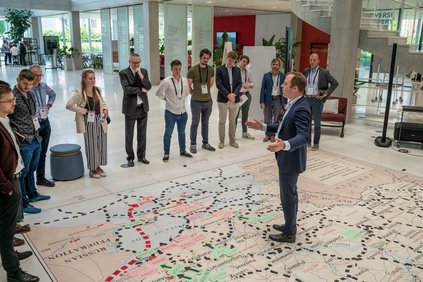Campus - 13.10.2023 - 07:00
St.Gallen's ex-theatre director hones communication techniques with HSG students
Successful communication is crucial in the professional world, too. Former St.Gallen theatre director Tim Kramer teaches a course in which HSG students can learn how to communicate in difficult situations.

Tim Kramer was theatre director at the Theater St.Gallen for nine years until 2016. He still has close ties with the city today: In 2022, for example, he appeared on stage at St.Gallen's independent "Parfin de Siècle" theatre. To this day, he also returns regularly to teach students at the HSG: In the autumn semester of 2023, Kramer will lead the course "Making an impression – learning from the actor". In it, students practise how to read the other person's communication and direct their own communication accordingly.
"But I don't just teach them how to convince their counterparts, how to 'sell' them something. It's more about putting people at the centre of their communication," says Kramer. In an interview with the St.Gallen culture magazine "Saiten", he had this to say: "Just as I am convinced that the actor is at the centre of the theatre, for those leaving the HSG, their actions must be centred around the human being, not the profit. It's a noble cause, but you wouldn't believe how open some of these young people are to it."
Failure as a teaching method
"In theatre, constant trial and error is part of developing a play," says Kramer. He also implements this approach in the course: After theoretical and practical introductions, all participants individually give a speech in front of the group on a topic of their choice. Kramer and the students give the presenters feedback on their performance, which is then repeated in whole or in part as far as possible.
This step-by-step failure is a new way of learning for many students, Kramer observes. In this way, the course also promotes critical faculties among these young men and women. "And because we see each other again and again as a group over the course of a semester, a relationship of trust also develops, within which real experiments are possible."
SQUARE offers the perfect setting
When Kramer was still St.Gallen's theatre director, he sometimes used the rehearsal stage of the theatre in the west of the city with the students. In the years that followed, finding a space at the HSG suitable for the course was a challenge: It needed to be relatively large and at the same time offer enough empty space. "With the opening of the SQUARE, I now have the perfect infrastructure – the rooms are spacious and you can, indeed should, rearrange them flexibly." The first thing he and the students did was to move the tables and chairs aside.
The course itself also starts with physical exercises such as clapping games or coordination tasks together with a partner. "This shifts the focus away from the mental and towards the physical, and is a classic method in acting classes. Ultimately, this leads to more presence and focus," says Kramer.
Applying acting to the professional world
According to the description, the aim of the course is to teach methodological tools from acting. Kramer's course relies on the research of theatre theorist and director Konstantin Stanislawski, according to whose approach theatre should be as realistic as possible. Among other things, this research established "method acting", which later became famous, in which actors draw on their own emotions and memories. "Many people believe that acting is mainly improvisation, but there are well-tested methods that are used," says Kramer, who also performed as an actor himself during his time in St.Gallen. These days he is artistic director and coordinator of teaching at the August Everding Theatre Academy in Munich. This is the largest training centre for stage professions in Germany.
Kramer sees possible areas of application for the acting skills of HSG students in a variety of professional situations: "Conceivable examples are conflict management and conveying information in team settings or in presentations." Ultimately, it is about understanding the other person and their motives and mirroring them to a certain extent.
More articles from the same category
This could also be of interest to you
Discover our special topics
















